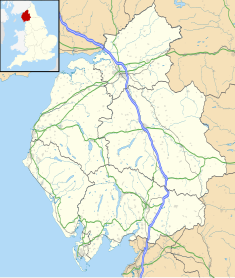| County Hall | |
|---|---|
 | |
| Location | Kendal |
| Coordinates | 54°19′54″N 2°44′51″W / 54.3317°N 2.7476°W / 54.3317; -2.7476 |
| Built | 1939 |
| Architect | Verner Owen Rees |
| Architectural style(s) | Neo-Georgian style |
| Listed Building – Grade II | |
| Designated | 27 February 2013 |
| Reference no. | 1410338 |
  | |
The County Hall, also known as County Offices, is a building in Stricklandgate, Kendal, England. The structure, which was the headquarters of Westmorland County Council from 1939 to 1974, is a Grade II listed building.
History
In the early 20th century the town hall in Kendal was the meeting place of Westmorland County Council. After finding that the town hall was too cramped to accommodate both the town council and the county council, council leaders decided to procure a dedicated county headquarters: the site they chose was open land on the corner of Stricklandgate and Busher Walk.
The new building, which was designed by Verner Owen Rees in the Neo-Georgian style and built by local builders, G. F. Martindale, was opened as "Westmorland County Hall" in 1939. The design involved a symmetrical main frontage with nine bays facing onto Stricklandgate; the central bay featured a doorway on the ground floor with a rectangular fanlight containing the county coat of arms; there was a sash window on the first floor and a central turret with a square clock at roof level. Internally, the principal room was the council chamber. A brass plaque commemorating council staff who had died in the Second World War was erected in the vestibule of the building after the war.
After leaving the Royal train at Arnside railway station, Queen Elizabeth II, accompanied by the Duke of Edinburgh, visited Westmorland County Hall in August 1956. An emergency control centre, which was intended to accommodate staff in the event of a nuclear attack, was installed in the basement of the building in the 1960s.
Following the implementation of the Local Government Act 1972, Westmorland County Council and Cumberland County Council amalgamated to form a single county council known as Cumbria County Council in 1974. The building was renamed "Kendal County Offices" and continued to serve as the local register office and also as the Kendal and Whitehaven Archive Centre. Although the administrative offices of Cumbria County Council were at Cumbria House in Botchergate in Carlisle, formal meetings of the Council continued to be held at the County Offices in Kendal. A programme of major refurbishment works in the archive centre involving the creation of two new strong rooms was completed in spring 2019. In October 2019, the environmental movement, Extinction Rebellion, held a demonstration outside the building.
Cumbria County Council was abolished on 1 April 2023, with the southern and eastern areas becoming part of the new unitary authority of Westmorland and Furness. The new Westmorland and Furness Council initially met at the County Hall. In June 2024 the council decided to close the building in September 2024 and move meetings, staff and services to Kendal Town Hall and South Lakeland House.
References
- ^ Historic England. "County Offices, Kendal (1410338)". National Heritage List for England. Retrieved 2 September 2019.
- "Kendal Birth & Baptism Records". Retrieved 1 September 2019.
- "Ordnance Survey Map". 1920. Retrieved 10 October 2020.
- "Kendal's County Offices granted Grade II listed status". Westmorland Gazette. 20 March 2013. Retrieved 14 November 2020.
- "County Hall - Kendal, Cumbria UK - Town Clocks". Waymarking. Retrieved 10 October 2020.
- "Westmorland County Council". Memorials Online. Retrieved 10 October 2020.
- "The Queen in Westmorland in 1956". The Westmorland Gazette. Retrieved 10 October 2020.
- ^ Holloway, Norman (2012). Kendal Through Time. Amberley Publishing. ISBN 978-1445608129.
- "Hundreds take 'chilling' glimpse at Kendal's nuclear bunker". The Westmorland Gazette. 14 September 2017. Retrieved 1 September 2019.
- Local Government Act 1972. 1972 c.70. The Stationery Office Ltd. 1997. ISBN 0-10-547072-4.
- "Full Constitution" (PDF). Cumbria County Council. 1 October 2018. p. 3. Retrieved 1 September 2019.
- "Cumbria Archive Service investment and refurbishment". Cumbria Crack. 27 March 2018. Retrieved 14 November 2020.
- "Mixed views on coal mine approval as Extinction Rebellion group protest decision". News and Star. 5 October 2019. Retrieved 14 November 2020.
- "New council pledges unique HQs for communities". Cumbria Crack. 13 September 2022. Retrieved 16 September 2023.
- "Cabinet agenda, 12 September 2023". Westmorland and Furness Council. Retrieved 16 September 2023.
- Fletcher, Joe (12 September 2022). "New council to have headquarters in Barrow, Kendal and Penrith". The Mail. Retrieved 25 July 2024.
- Hunt, Dan (5 June 2024). "Council set to close 'obsolete' County Hall". BBC News. Retrieved 25 July 2024.
- "Council services moving to South Lakeland House and Kendal Town Hall". Westmorland and Furness Council. 19 September 2024. Retrieved 17 November 2024.